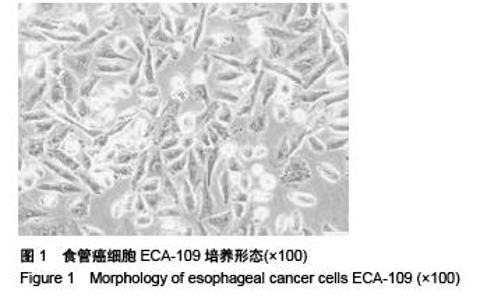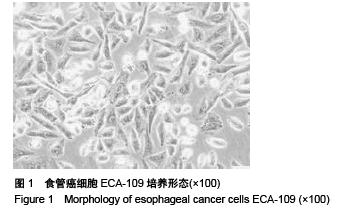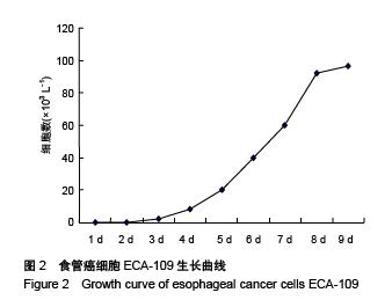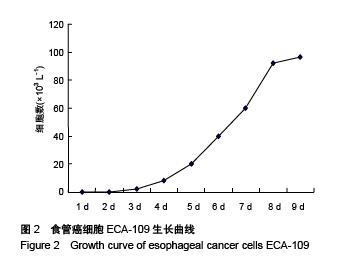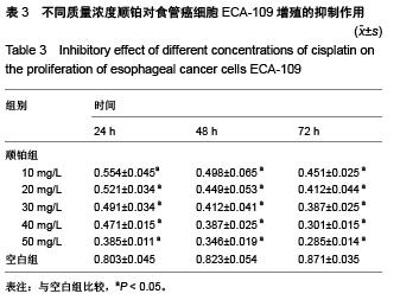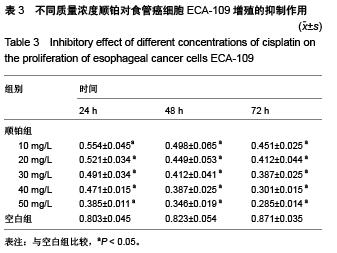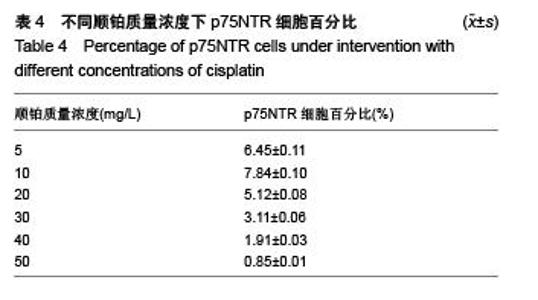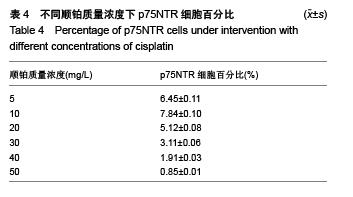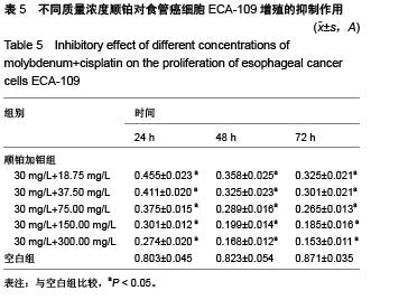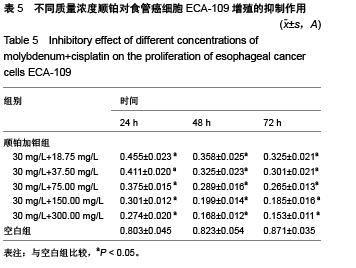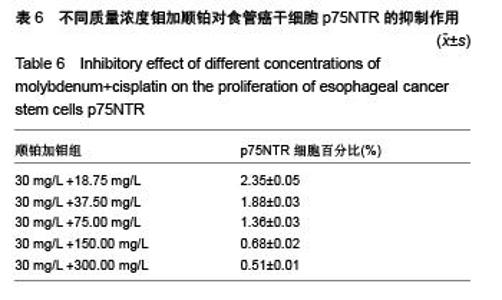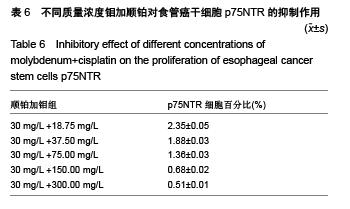Chinese Journal of Tissue Engineering Research ›› 2015, Vol. 19 ›› Issue (50): 8084-8089.doi: 10.3969/j.issn.2095-4344.2015.50.009
Previous Articles Next Articles
Molybdenum effect on ECA-109 cell chemosensitization and p75NTR cell inhibition
Cai Zhong-li 1, Ding Chun-ping2, Ji Sheng-hui2, Liu Hong-feng2, Chen Fan-zhou2
- 1Department of Thoracic Surgery, First Affiliated Hospital of Nanyang Medical College, Nanyang 473000, Henan Province, China; 2Department of Orthopedics, Third Affiliated Hospital of Nanyang Medical College, Nanyang 473000, Henan Province, China
-
Received:2015-11-03Online:2015-12-03Published:2015-12-03 -
About author:Cai Zhong-Li, Attending physician, Department of Thoracic Surgery, First Affiliated Hospital of Nanyang Medical College, Nanyang 473000, Henan Province, China
CLC Number:
Cite this article
Cai Zhong-li,Ding Chun-ping, Ji Sheng-hui, Liu Hong-feng, Chen Fan-zhou. Molybdenum effect on ECA-109 cell chemosensitization and p75NTR cell inhibition[J]. Chinese Journal of Tissue Engineering Research, 2015, 19(50): 8084-8089.
share this article
| [1] 刘建军,吴学辉,赵炳芬,等.食管癌放疗联合口服替加氟化疗增敏的疗效观察[J].医学信息(中旬刊),2011,24(2):642. [2] 侯振山,李宏伟,申勇萌,等.局部晚期、局部复发食管癌的三维适形放疗加同期增敏化疗的研究[J].中国现代药物应用,2010, 4(18):125. [3] 赵兴,周毛,王立平,等.甘氨双唑钠增敏食管癌后程加速超分割放疗协同化疗的临床研究[J].实用肿瘤杂志,2012,27(4):358- 361. [4] 郑嘉欣.微量元素与肿瘤相关性研究的热点及争议[J].国际肿瘤学杂志,2010,37(2):117-119. [5] Akutsu Y, Shuto K, Kono T, et al. A phase 1/11 study of second-line chemotherapy with fractionated docetaxel and nedaplatin for 5-FU/cisplatin-resistant esophageal squamous cell carcinoma. Hepatogastroenterology. 2012;59(119): 2095-2098. [6] Fencl P, Belohlavek O, Harustiak T, et al. The analysis of factors affecting the threshold on repeated 18F-FDG-PET/CT investigations measured by the PERCIST protocol in patients with esophageal carcinoma. Nucl Med Commun. 2012; 33(11): 1188-1194. [7] 陈伯扬.微量元素钼的抗癌作用[J].微量元素与健康研究,2008, 25(2): 68-69. [8] 陈苏,向小龙,陈洪波,等.血清中微量元素的变化在膀胱癌患者诊断及防治中的意义[J].中国综合临床,2015,31(2):172-173, 174. [9] 田春阁.食管癌三维适形放疗联合紫杉醇增敏化疗的临床观察[J].中国医疗前沿,2013,8(17):66. [10] Ji Y, Zheng MF, Ye SG, et al. Agrocybe aegerita polysaccharide combined with chemotherapy improves tumor necrosis factor-α and interferon-γ levels in rat esophageal carcinoma. Dis Esophagus. 2013;26(8):859- 863. [11] Kobayashi N, Nakayama H, Osaka Y, et al. Tumor response after low-dose preoperative radiotherapy combined with chemotherapy for squamous cell esophageal carcinoma. Anticancer Res. 2013;33(3):1157-1161. [12] Choi N, Park SD, Lynch T, et al. Twice-daily radiotherapy as concurrent boost technique during two chemotherapy cycles in neoadjuvant chemoradiotherapy for resectable esophageal carcinoma: mature results of phase II study. Int J Radiat Oncol Biol Phys. 2004;60(1):111-122. [13] 刘树利.微量元素测定在肿瘤患者诊断及防治中的意义[J].检验医学与临床,2013,10(6):673-674. [14] 王玉斌,林玉成,王建化,等.比较紫杉醇联合奈达铂同期放化疗与奈达铂增敏放疗对食管癌的疗效[J].中国医师进修杂志,2014, 37(5):62-63. [15] 蔡君东,刘晶,曾淑超,等.三维适形放疗联合周剂量奈达铂及体外高频热疗治疗中晚期食管癌的临床研究[J].现代肿瘤医学,2013, 21(12):2715-2718. [16] 张兆,佟冬冬,李青,等.p75NTR 对舌鳞癌 Tca8113细胞凋亡的影响[J].实用口腔医学杂志,2015,31(1):15-18,19. [17] 孙国贵,胡万宁,于秀荣,等.MnSOD过量表达与BSO对食管癌细胞系的增敏效应[J].基础医学与临床,2011,31(12):1314-1319. [18] 李俊峰,陈莲香,吕霞,等.p75NTR蛋白体外通过TrkANGFR/p75NTR异源二聚体信号途径促进L02细胞增殖[J].中华消化杂志,2012,32(4):256-261. [19] 李晓青,陈鑫,黄珊,等.下调miR-21可以增强食管癌TE-1细胞的放射敏感性[J].南方医科大学学报,2012,32(11):1559-1563. [20] 孙志刚,黄盛东,张宝仁,等.应用p75NTR分选食管肿瘤干细胞并鉴定其生物学特性[J].第二军医大学学报,2009,30(5):481-486. [21] 郑娇娇,吴清明,陈建华,等.P162对食管癌细胞株Eca109的放射增敏作用及其对p75NTR表达的影响[J].中国病理生理杂志, 2013,29(1):1-6. [22] 郑娇娇.P162对食管癌细胞株Eca109的放射增敏作用及其对p75NTR表达的影响[D]. 武汉:武汉科技大学,2013. [23] 钱悦,陈思远,黄长征,等.神经生长因子及其高亲和受体酪氨酸激酶、低亲和公共受体p75NTR在扁平苔藓皮损中的表达及意义[J].中华皮肤科杂志,2014,47(4):275-277. [24] 叶仕新.p75NTR阳性人食管鳞癌细胞的干细胞特性研究[D]. 福州:福建医科大学,2012. [25] 陈琦,吴清明,程静,等.冬凌草甲素对食管癌干细胞放射增敏作用的研究[J].中国现代医学杂志,2012,22(29):57-60. [26] 谷见法,冯沛贝,路平,等.三氧化二砷联合热疗对食管癌细胞株EC-1放疗的增敏作用研究[J].中国全科医学,2014,17(24): 2826-2830. [27] 刘宗展.奈达铂增敏放疗与单纯放疗治疗50例食管癌的疗效对比分析[J].中国医药指南,2013,11(15):34-35.
[28] 温丰标,赵松,杨洋,等.胰岛素对人食管鳞癌细胞化疗增敏的影响及作用机制[J].中国老年学杂志,2013,33(10):2320-2322. [29] Kim MK, Cho KJ, Park SI, et al. Initial stage affects survival even after complete pathologic remission is achieved in locally advanced esophageal cancer: analysis of 70 patients with pathologic major response after preoperative chemoradiotherapy. Int J Radiat Oncol Biol Phys. 2009; 75(1):115-121. [30] Akutsu Y, Kono T, Uesato M, et al. S-1 monotherapy as second- or third-line chemotherapy for unresectable and recurrent esophageal squamous cell carcinoma. Oncology. 2013;84(5):305-310. [31] 冉晨曦,何人可,汤小玲,等.肿瘤放射治疗中辐射增敏剂的应用进展[J].山东医药,2015,55(3):86-88. [32] 钱宇,马建芬,曹博强,等.放疗增敏剂相关研究进展[J].山东医药, 2013,53(48):79-82. [33] 李晓红.放疗增敏剂在老年食管癌放疗中的疗效评价[J].中国当代医药,2012,19(30):102-103. [34] Koo DH, Park SI, Kim YH, et al. Phase II study of use of a single cycle of induction chemotherapy and concurrent chemoradiotherapy containing capecitabine/cisplatin followed by surgery for patients with resectable esophageal squamous cell carcinoma: long-term follow-up data. Cancer Chemother Pharmacol. 2012;69(3):655-663. [35] 黄其春.肿瘤内科治疗增敏剂的研究进展[J].内科,2011,6(5): 486-488. [36] 赵生霞,黄燕燕,慕晓玲,等.食管癌Eca109单克隆细胞株的干细胞特性研究[J].石河子大学学报:自然科学版,2013,31(2): 197-201. [37] 黄盛东,刘晓红,袁扬,等.食管癌中p75NTR阳性细胞池的变化与顺铂耐药机制的研究[J].中华实验外科杂志,2007,24(12):1560-1562. [38] 吴广银,韩倩,朱庆尧,等.胰岛素样生长因子1受体抑制剂对人食管癌移植瘤放射增敏研究[J].中华放射医学与防护杂志,2013, 33(4):376-379. [39] 米登海,任维维,田金徽,等.甘氨双唑钠对食管癌放射治疗增敏作用的Meta分析[J].中国循证医学杂志,2012,12(9):1122-1128. |
| [1] | Jiang Tao, Ma Lei, Li Zhiqiang, Shou Xi, Duan Mingjun, Wu Shuo, Ma Chuang, Wei Qin. Platelet-derived growth factor BB induces bone marrow mesenchymal stem cells to differentiate into vascular endothelial cells [J]. Chinese Journal of Tissue Engineering Research, 2021, 25(25): 3937-3942. |
| [2] | Chen Yang, Huang Denggao, Gao Yuanhui, Wang Shunlan, Cao Hui, Zheng Linlin, He Haowei, Luo Siqin, Xiao Jingchuan, Zhang Yingai, Zhang Shufang. Low-intensity pulsed ultrasound promotes the proliferation and adhesion of human adipose-derived mesenchymal stem cells [J]. Chinese Journal of Tissue Engineering Research, 2021, 25(25): 3949-3955. |
| [3] | Zhang Lishu, Liu Anqi, He Xiaoning, Jin Yan, Li Bei, Jin Fang. Alpl gene affects the therapeutic effect of bone marrow mesenchymal stem cells on ulcerative colitis [J]. Chinese Journal of Tissue Engineering Research, 2021, 25(25): 3970-3975. |
| [4] | Ruan Guangping, Yao Xiang, Liu-Gao Miyang, Cai Xuemin, Li Zian, Pang Rongqing, Wang Jinxiang, Pan Xinghua. Umbilical cord mesenchymal stem cell transplantation for traumatic systemic inflammatory response syndrome in tree shrews [J]. Chinese Journal of Tissue Engineering Research, 2021, 25(25): 3994-4000. |
| [5] | Mo Jianling, He Shaoru, Feng Bowen, Jian Minqiao, Zhang Xiaohui, Liu Caisheng, Liang Yijing, Liu Yumei, Chen Liang, Zhou Haiyu, Liu Yanhui. Forming prevascularized cell sheets and the expression of angiogenesis-related factors [J]. Chinese Journal of Tissue Engineering Research, 2021, 25(22): 3479-3486. |
| [6] | Chen Lei, Zheng Rui, Jie Yongsheng, Qi Hui, Sun Lei, Shu Xiong. In vitro evaluation of adipose-derived stromal vascular fraction combined with osteochondral integrated scaffold [J]. Chinese Journal of Tissue Engineering Research, 2021, 25(22): 3487-3492. |
| [7] | Wei Qin, Zhang Xue, Ma Lei, Li Zhiqiang, Shou Xi, Duan Mingjun, Wu Shuo, Jia Qiyu, Ma Chuang. Platelet-derived growth factor-BB induces the differentiation of rat bone marrow mesenchymal stem cells into osteoblasts [J]. Chinese Journal of Tissue Engineering Research, 2021, 25(19): 2953-2957. |
| [8] | Chen Xiao, Guo Zhi, Chen Lina, Liu Xuanyong, Zhang Yihuizhi, Li Xumian, Wang Yueqiao, Wei Liya, Xie Jing, Lin Li. Factors affecting the mobilization and collection of autologous peripheral blood hematopoietic stem cells [J]. Chinese Journal of Tissue Engineering Research, 2021, 25(19): 2958-2962. |
| [9] | Guo Zhibin, Wu Chunfang, Liu Zihong, Zhang Yuying, Chi Bojing, Wang Bao, Ma Chao, Zhang Guobin, Tian Faming. Simvastatin stimulates osteogenic differentiation of bone marrow mesenchymal stem cells [J]. Chinese Journal of Tissue Engineering Research, 2021, 25(19): 2963-2968. |
| [10] | Li Congcong, Yao Nan, Huang Dane, Song Min, Peng Sha, Li Anan, Lu Chao, Liu Wengang. Identification and chondrogenic differentiation of human infrapatellar fat pad derived stem cells [J]. Chinese Journal of Tissue Engineering Research, 2021, 25(19): 2976-2981. |
| [11] | Gao Yuanhui, Xiang Yang, Cao Hui, Wang Shunlan, Zheng Linlin, He Haowei, Zhang Yingai, Zhang Shufang, Huang Denggao. Comparison of biological characteristics of adipose derived mesenchymal stem cells in Wuzhishan inbreed miniature pigs aged two different months [J]. Chinese Journal of Tissue Engineering Research, 2021, 25(19): 2988-2993. |
| [12] | Cao Yang, Zhang Junping, Peng Li, Ding Yi, Li Guanghui. Isolation and culture of rabbit aortic endothelial cells and biological characteristics [J]. Chinese Journal of Tissue Engineering Research, 2021, 25(19): 3000-3003. |
| [13] | Dai Min, Wang Shuai, Zhang Nini, Huang Guilin, Yu Limei, Hu Xiaohua, Yi Jie, Yao Li, Zhang Ligang. Biological characteristics of hypoxic preconditioned human amniotic mesenchymal stem cells [J]. Chinese Journal of Tissue Engineering Research, 2021, 25(19): 3004-3008. |
| [14] | Qin Yanchun, Rong Zhen, Jiang Ruiyuan, Fu Bin, Hong Xiaohua, Mo Chunmei. Chinese medicine compound preparation inhibits proliferation of CD133+ liver cancer stem cells and the expression of stemness transcription factors [J]. Chinese Journal of Tissue Engineering Research, 2021, 25(19): 3016-3023. |
| [15] | Dai Yaling, Chen Lewen, He Xiaojun, Lin Huawei, Jia Weiwei, Chen Lidian, Tao Jing, Liu Weilin. Construction of miR-146b overexpression lentiviral vector and the effect on the proliferation of hippocampal neural stem cells [J]. Chinese Journal of Tissue Engineering Research, 2021, 25(19): 3024-3030. |
| Viewed | ||||||
|
Full text |
|
|||||
|
Abstract |
|
|||||
